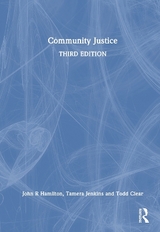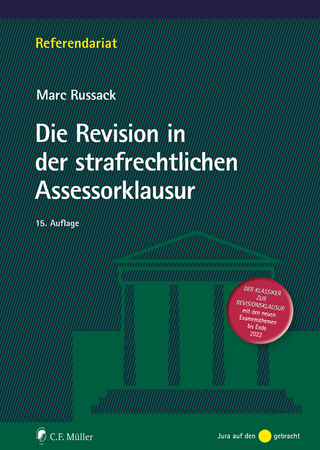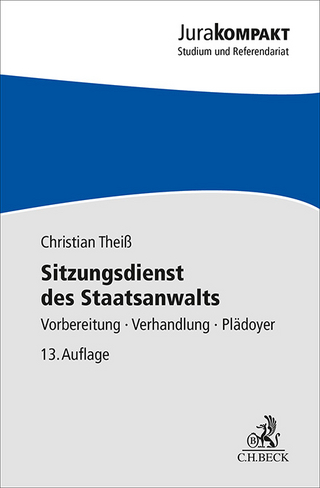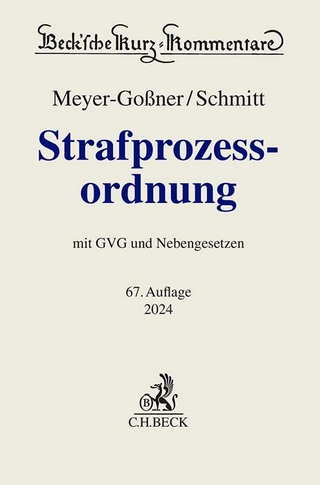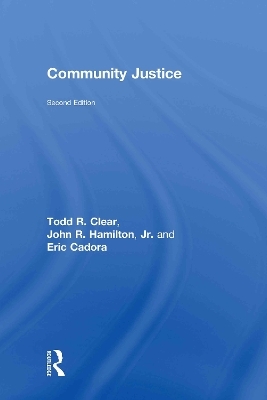
Community Justice
Routledge (Verlag)
978-0-415-78026-1 (ISBN)
- Titel erscheint in neuer Auflage
- Artikel merken
Community Justice discusses concepts of community within the context of justice policy and programs, and addresses the important relationship between the criminal justice system and the community in the USA.
Taking a bold stance in the criminal justice debate, this book argues that crime management is more effective through the use of informal (as opposed to formal) social control. It demonstrates how an increasing number of criminal justice elements are beginning to understand that the development of partnerships within the community that enhance informal social control will lead to a stabilization and possible a decline in crime, especially violent crime, and make communities more liveable. Borrowing from an eclectic toolbox of ideas and strategies - community organizing, environmental crime prevention, private-public partnerships, justice initiatives – Community Justice puts forward a new approach to establishing safe communities, and highlights the failure of the current American justice system in its lack of vision and misuse of resources.
Providing detailed information about how community justice fits within each area of the criminal justice system, and including relevant case studies to exemplify this philosophy in action, this book is essential reading for undergraduate and postgraduate students of subjects such as criminology, law and sociology.
Todd R. Clear is Dean of the School of Criminal Justice at Rutgers University, Newark NJ, USA. He is a past president of the American Society of Criminology and the Academy of Criminal Justice Sciences. John Hamilton is Associate Professor of Criminal Justice Administration at Park University. He retired at the rank of Major from the Kansas City, Missouri Police Department after 26½ years of service. He has extensive experience in community policing and problem solving, and is also member of the Board of Directors for Synergy Services, Inc. Eric Cadora is Founder and Director of the Justice Mapping Center. Prior to establishing the Center, he has served as Program Officer for The After Prison Initiative at the Open Society Institute; as Director for Research and Policy, Court Communications, and Day Centre divisions of the Centre for Alternative Sentencing and Employment Services (CASES); and has also conducted graduate work at New York University.
1. Criminal Justice and the Community Criminal Justice and Social Justice The Importance of "Place" What is Community? How Do Neighborhoods Affect Community Life? Place-Based Strategies and Public Safety Goals Community Oriented Strategies in Criminal Justice Comprehensive Community Change Initiatives Evaluation of Community Justice Initiatives Community Justice Within Traditional Criminal Justice Functions Police Courts Corrections Conclusion Web Resources References 2. Policing and Community Justice A Brief History of Community Policing Police and the Community: A Dual-Track Rationale The Community Relations Rationale for Community Policing The Police: Essential Services Ensnared in a Quandary Police as a Symbol of Modern Culture Police as a Function of the Legal System Police as a Function of Power in Society The Criminal Justice Rationale for Community Policing Community Policing Community-Building Strategies Problem-Oriented Strategies Broken Windows Strategies Community Policing and Community Justice Web Resources References 3. The Courts and Community Justice Criminal Cases, Communities, and Courts The Two Functions of Criminal Courts Adjudication of Complaints Sanctioning Wrongdoers How Courts Work Today Is That the Way the Law Really Operates in Practice? The Victim of Crime The Community Court A Historical Look at Community Courts The Contemporary Community Court Movement Community-Oriented Court Functions Community-Oriented Adjudication Community-Oriented Sanctioning Courts for Specialized Communities Drug Courts Domestic Violence Courts Mental Health Courts Teen Courts Re-Entry Courts Web Resources References 4. Corrections and Community Justice Themes in Traditional Correctional Services Offender Management Risk Treatment Surveillance and Control Punishment Themes in Correctional Community Justice Neighborhoods and Communities Partnerships Victims and Communities Problem Solving Restoration Integrating Traditional Correctional Thought into the Community Justice Framework How Community Justice Changes the Traditional Correctional Functions Community Justice and Probation Community Justice and the Jail Community Justice and the Prison Community Justice and Parole (Re-entry) Community Corrections and Restoration Women in Prison Community Justice Centers in the Neighborhood Context: A Vision for the Future Web Resources References 5. The Future of Community Justice The Essentials of Community Justice Place Adding Value Public Safety Varieties of Community Justice Goals Continuum Means Continuum Four Prototypes of Community Justice Programs: The Models of Community Justice Involvement Model Partnership Model Mobilization Model Intermediary Model Which Community Justice Model is Best? Issues in Community Justice The Future of Community Justice References Appendix. Community Justice as a Strategy: How CASES Make it Work Partnership Development Information Analysis Resource Leveraging How Does Community Justice Look in the Long Term?
| Erscheint lt. Verlag | 26.11.2010 |
|---|---|
| Zusatzinfo | 1 Tables, black and white; 1 Line drawings, black and white; 1 Illustrations, black and white |
| Verlagsort | London |
| Sprache | englisch |
| Maße | 156 x 234 mm |
| Gewicht | 470 g |
| Themenwelt | Recht / Steuern ► EU / Internationales Recht |
| Recht / Steuern ► Strafrecht ► Strafverfahrensrecht | |
| ISBN-10 | 0-415-78026-8 / 0415780268 |
| ISBN-13 | 978-0-415-78026-1 / 9780415780261 |
| Zustand | Neuware |
| Informationen gemäß Produktsicherheitsverordnung (GPSR) | |
| Haben Sie eine Frage zum Produkt? |
aus dem Bereich
